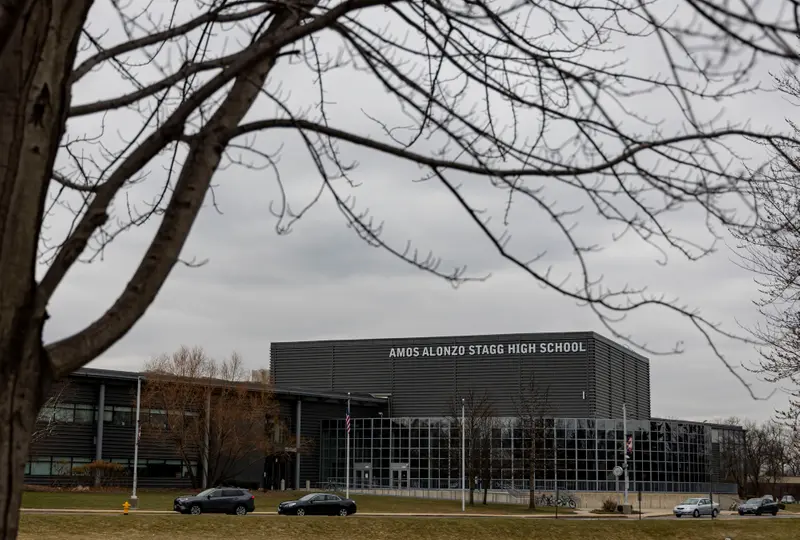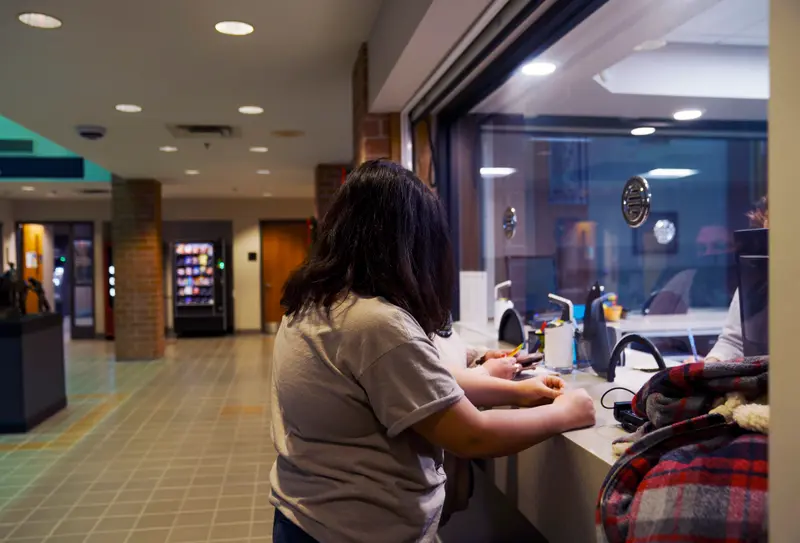ProPublica is a nonprofit newsroom that investigates abuses of power. Sign up for Dispatches, a newsletter that spotlights wrongdoing around the country, to receive our stories in your inbox every week.
This story is a collaboration between ProPublica and the Chicago Tribune.
A new bill in the Illinois House aims to stop schools from working with police to issue students tickets for minor misbehavior, a harmful and sometimes costly practice that many districts have continued despite pleas to stop from the state’s top education officials.
An investigation by ProPublica and the Chicago Tribune revealed last year that school-based ticketing was rampant across Illinois, with police writing citations that can result in a fine of up to $750 for conduct once handled by the principal’s office.
A 2015 Illinois law prohibits schools from fining students as a form of discipline; school officials instead have been referring students to police, who then ticket the students for fighting, littering, theft, possessing vaping devices and other violations of local ordinances.
The new legislation, introduced last month, would amend the state’s school code to make it illegal for school personnel to involve police to issue students citations for incidents that can be addressed through a school’s disciplinary process.
“We have to close that loophole and end school-based ticketing,” said Rep. La Shawn Ford, a Democrat from Chicago who is sponsoring the legislation. “There is no place for this type of system to be in our schools.”
Ford’s legislation deals only with school tickets, which are issued for civil violations of local laws and often are adjudicated in administrative hearings. The bill is not intended to stop police from arresting students for crimes. It would also not prevent schools from seeking restitution from students for lost, stolen or damaged property.
After the Tribune and ProPublica began publishing the investigative series “The Price Kids Pay” in April 2022, then-state education Superintendent Carmen Ayala urged schools to stop working with police to ticket students and “consider both the cost and the consequences of these fines.”
The investigation documented about 12,000 tickets written to students over three school years and also found that, in places where information was available on the race of ticketed students, Black students were twice as likely to be ticketed as their white peers. (Use our interactive database to look up how many and what kinds of tickets have been issued in an Illinois public school or district.)
Some school districts heeded Ayala’s plea or scaled back on ticketing, but new reporting shows that many others have continued the practice into this school year.
Over the last seven weeks, ProPublica and the Tribune sought new ticketing records for roughly 60 Illinois schools in districts that had some of the highest numbers of citations in previous years. Reporters have been able to obtain ticket records in 37 of those schools so far and found that students in 26 — or 70% — of them have been ticketed this school year, though some districts have scaled back the practice.
Ticketing has continued even in District U-46, the state’s second-largest district, where then-Superintendent Tony Sanders had been shocked to learn of the practice and told his administrators and police working in district schools to stop ticketing students. At the same time, he tweaked the student code of conduct to limit when schools should involve police in student incidents.
Sanders, who took over last week as the new state superintendent, said Wednesday he was “appalled and saddened” to learn that students are still being cited by school-based police, known as resource officers, in some of the district’s schools.
At South Elgin High School in U-46, students have not received any tickets this year, compared with 83 last school year. But police have ticketed students at the district’s Bartlett High School, most often for fighting and possession of cannabis, with fines between $50 and $250. At the two U-46 high schools in the city of Elgin, students have been ticketed, but city officials initially assigned them to counseling or another community program instead of a fine.
“I tried to do it by saying, ‘Effective immediately, we’re not doing it any longer.’ That clearly didn't work,” Sanders said in an interview. “I think legislation is needed. I think professional development for staff in schools and school resource officers is needed. You can’t just say, ‘No more ticketing,’ and have that be effective.”
The Illinois State Board of Education supports Ford’s legislation, Sanders said, and is helping shape the language of the final bill.
U-46 district spokesperson Tara Burghart said administrators have been told they cannot sign tickets as complainants. She said the schools don’t decide whether to ticket and fine students; the police and municipalities do.
Ticketing students is also still routine at McHenry Community High School in McHenry, Amos Alonzo Stagg High School in Palos Hills and Plainfield South High School on the border of Plainfield and Joliet, for example. At Stagg, police have written students more tickets so far this school year than they did in all of the 2021-22 school year. Most of the tickets were for tobacco vaping devices or for cannabis, records show.
A spokesperson for Consolidated High School District 230, which includes Stagg, said the district believes that school officials “are obligated to inform local police” when a city ordinance is violated.
“If a student is smoking or vaping while at school, they are still breaking the law and there are consequences to those actions. Smoking at school does not preclude police from enforcing the law,” spokesperson Jennifer Waterman wrote in an email. “We take all offenses seriously. We want our halls to be clean, safe and secure.”

In East Peoria Community High School District 309, where students this year have continued to get tickets for theft, for fighting and for possession of cannabis and vape materials, Superintendent Marjorie Greuter said the school still refers students to police for tickets so the school doesn’t become a place where young people can break the law without consequences.
“This would, in effect, make the school a ‘safe’ zone for breaking an ordinance,” she said.
East Peoria police records show that officers ticket young people at the high school more than anywhere else in the city.
At schools throughout the state, students and their families have continued to pay a high price. McHenry High School students have been issued more than 50 tickets so far this school year, and the city has imposed at least $7,500 in fines and fees, records show. High school students in Oswego got more than 40 tickets totaling over $7,000. At Jacobs High School in Algonquin, police have written 28 tickets at $100 each, police records show. In all, at 11 high schools in McHenry, Palos Hills, Oswego, Algonquin and Plainfield, the fines for about 250 tickets totaled more than $36,000. (Oswego, McHenry, Algonquin and Plainfield school officials did not respond to requests for comment.)
“It is not an effective tool when you write these tickets. Children are children. They don’t pay. It drives the parents deeper in debt and causes them to be responsible. It is just a total economic injustice,” Ford said.
Ayala similarly said in her letter to school officials last April that issuing tickets does not lead to positive changes in behavior. “There is no evidence that tickets lead to fewer fights or less vaping,” she wrote.
The steep costs associated with ticketing drew the attention of Debt Free Justice Illinois, a coalition of advocacy groups working to end fines and fees for youths in the justice system. That group is behind efforts to change Illinois law in response to the Chicago Tribune-ProPublica investigation.
“There’s an increasing recognition of the financial penalties that go along with this and the impact of those financial penalties,” said Lisa Jacobs, an associate director with the legislation and policy clinic at Loyola University Chicago School of Law. Jacobs has been working with the coalition.
Some communities have scaled back how often students were ticketed and for what reasons. Last school year, for example, police in Woodstock, northwest of Chicago, wrote 87 tickets to students in Woodstock Community Unit School District 200, mostly for tobacco and cannabis possession. This school year, they have issued 10 tickets, all but one for fights, police records show.
In some places, such as Bloom Township High School District 206 in the suburbs south of Chicago and Naperville Community Unit School District 203 in the western suburbs, records from the districts and police show no citations issued to students this school year. Last school year, police issued nearly 60 tickets to Bloom Trail students and about 30 tickets to Naperville high school students, records show.
Bloom officials said last spring that they would end the practice of ticketing, while Naperville police said they have shifted to less punitive forms of discipline.
“While our emphasis was never solely on citations, our policy now focuses even more closely on restorative justice measures, which is likely responsible for the decrease in tickets,” Naperville Police Chief Jason Arres wrote in a statement. He said police department rules call for “fair and consistent” handling of incidents involving young people, “and we will remain committed to that moving forward.”
Naperville, however, has continued to prosecute a former Naperville North student who received a citation for theft in 2019 after she said she mistakenly took another student’s AirPods. Now a college student, Amara Harris has maintained her innocence and has refused to pay a fine. Her case is expected to go to trial this year.
Illinois Senate Majority Leader Kimberly Lightford, a Democrat from suburban Maywood, said she supports Ford’s legislation. Lightford was the chief sponsor of the 2015 law, known as Senate Bill 100, that broadly overhauled school discipline in the state, including a ban on fining students as punishment.
Lightford lamented that some school districts have found ways to get around the 2015 law, which did not penalize school districts for noncompliance.
“School districts have to be accountable for laws that we pass that they do not implement,” Lightford said.
Ford’s new bill, however, includes no oversight or enforcement measures for any districts that continue having students ticketed at school.
Students from Northwestern University’s Medill School of Journalism contributed to this reporting by filing public records requests.












